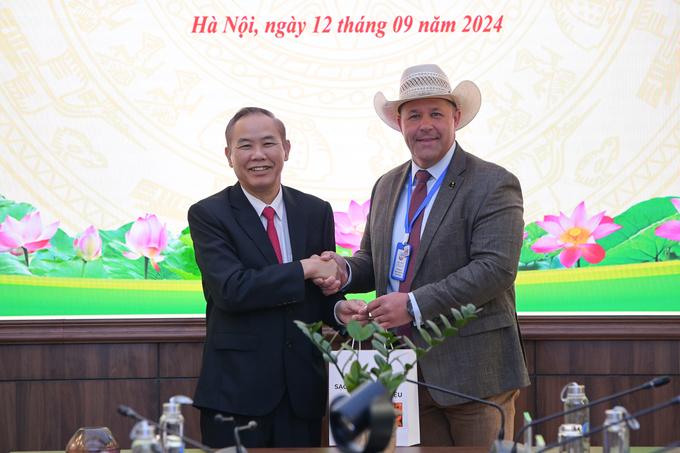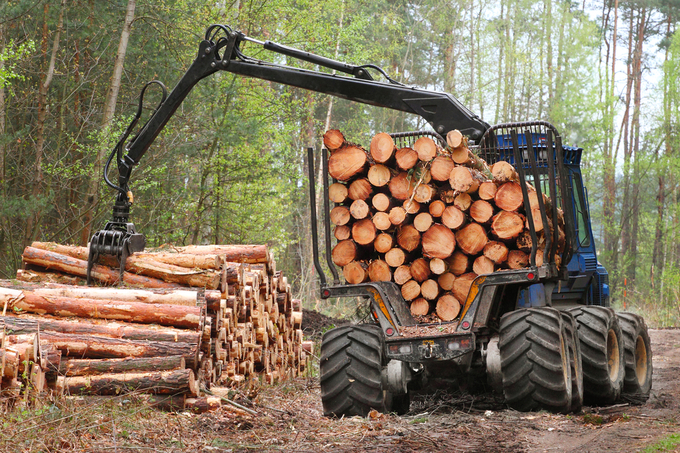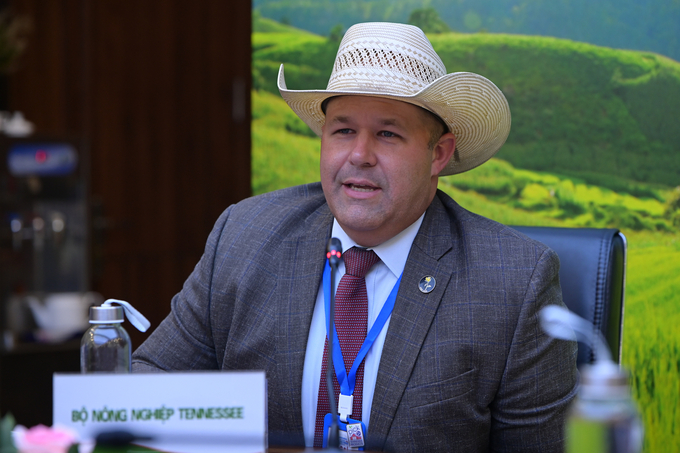June 18, 2025 | 17:39 GMT +7
June 18, 2025 | 17:39 GMT +7
Hotline: 0913.378.918
June 18, 2025 | 17:39 GMT +7
Hotline: 0913.378.918

Assistant Commissioner Andy Holt (right) met with Deputy Minister of Agriculture and Rural Development Phung Duc Tien (left). Photo: Tung Dinh.
In honor of the one-year anniversary of the Comprehensive Strategic Partnership, a U.S. trade delegation of 100 participants, including 35 U.S. business representatives, officials from nine State departments of agriculture and representatives from 21 USDA cooperators.
At the event, Vietnam Agriculture News spoke with Andy Holt – Assistant Commissioner of Business Development, Tennessee Department of Agriculture. The dialogue surrounded topics of sustainable forestry and trade opportunities for wood products between Vietnam and the U.S.
VAN: Can you share about Tennessee’s experience in sustainable forestry development?
Andy Holt: One of the most common questions we receive is about the sustainability of the forests we harvest wood from, not only for supply to Vietnam but to other countries around the world as well. This issue is very important to us, and it's something we consider frequently.
Currently, for every tree removed from our forests, we are growing 1.6 trees in return. This demonstrates our commitment to sustainability, which is not only a global concern but also a priority for us in Tennessee, particularly for those who own forest land. Our goal is to maintain sustainable forests so these areas can continue to be productive for future generations.
In fact, 52% of Tennessee's landmass is covered in forests, making forestry one of the largest sectors in the state. When it comes to sustainability, there are various metrics and programs recognized globally. However, the most effective approach we’ve found is to directly engage with stakeholders. For example, we’ve invited members of the Vietnamese furniture industry to visit Tennessee’s forests. This hands-on approach has been the best way to share our story and commitment to sustainable forestry.
This is my third visit to Vietnam. My first trip was to explore whether this market was suitable for supplying our forest products, and it quickly became clear that it was. We toured the Vietnamese furniture manufacturing industry, which is highly advanced with a skilled labor force and impressive integration of technology into the manufacturing processes.
Our second visit to Vietnam was to participate in one of the HAWA shows, specifically the handicraft and wood exhibition. This was a great opportunity to further engage with the local industry. Beyond that, we’ve also hosted delegations from Vietnam in the U.S., where we were able to show them our lumber milling and manufacturing processes firsthand. Through these visits, they gained a clear understanding of the sustainability of our forests.
It's important to note that these are not planted forests; they are natural forests that will remain so due to the topography of the land, which often isn't suitable for any purpose other than forestry. This ensures that our forestry practices are not only sustainable but also preserve the natural landscape.

The Tennessee Department of Agriculture emphasizes sustainability in forestry.
Additionally, it's crucial to emphasize that the forestry products you receive from the U.S., particularly from Tennessee, come from theft-free zones. This means that the wood is sourced responsibly, without encroaching on someone else's property, and managed sustainably. This commitment to ethical sourcing and sustainable management gives us a unique advantage and offers a distinctive, reliable material source for our partners.
Growing up in Tennessee, I always assumed that the diverse and rich hardwood forests I saw were common around the world. However, I’ve come to realize that our forests are truly special. We have some of the most sustainable and productive hardwood forests not just in Tennessee, but across sections of the U.S., which we are proud to share with the world.
VAN: Building on that, what do you think are the strengths of the forestry sectors and wood products in Vietnam and the U.S.?
Andy Holt: The U.S. benefits greatly from having extensive forests filled with large-diameter hardwood trees, which creates a robust forestry industry. This natural resource is not only sustainable, but it also provides a significant number of jobs in milling and manufacturing. The careful management of these forests ensures that they remain a valuable resource, contributing to both the economy and the environment, which is a major strength of our forestry sector.
On the other hand, Vietnam's strength lies in its highly developed furniture manufacturing industry, which is one of the largest in the world, second only to China. The industry is supported by a young, educated workforce and a well-established manufacturing infrastructure, which is impressive to witness. This sector not only showcases the craftsmanship and industrial capability of Vietnam but also plays a crucial role in providing employment and driving economic growth.
Another strength is the synergy between our two markets. The U.S., along with the European Union, supplies the raw materials, while Vietnam excels in manufacturing finished products. This trade dynamic benefits both sides: we export a substantial amount of raw lumber to Vietnam, where it is processed and then often re-exported as finished goods to the U.S. and other global markets.
Vietnam’s approach to sourcing logs from various parts of the world, including the U.S., is strategic. By purchasing logs directly, Vietnamese manufacturers have the flexibility to mill the wood to their exact specifications, ensuring that the final products meet their desired standards. This not only enhances the quality of the finished goods but also supports Vietnam's position as a leading player in the global furniture market.

Andy Holt shared insights about trade standards for wood products in the U.S. Photo: Tung Dinh.
VAN: Can you provide Vietnamese manufacturers with insights into wood production in the U.S.? This information will help facilitate the trading of wood products and wood materials between the two countries.
Andy Holt: One of the great assets we have in the U.S. is the National Hardwood Lumber Association's grading system. This system plays a crucial role in our hardwood industry as it ensures both the quality and consistency of our wood products. For manufacturers, including those in Vietnam, this grading system provides a reliable standard. When a furniture manufacturer in Vietnam, for example, purchases hardwood from Tennessee or anywhere else in the U.S., they can trust that the quality they are receiving matches the grading they were promised, without needing to be on-site to verify it.
This system brings predictability and continuity to the process, meaning manufacturers can expect the same quality not just in a single shipment but across all their orders. The NHLA grading system offers various grades, such as FAS (First and Seconds), and common grades like one common, two common, or three common. This range provides manufacturers with the flexibility to choose products that meet their specific needs and budgets.
For instance, if a furniture manufacturer is looking for a high-quality, consistent product, they might opt for FAS grade lumber. On the other hand, if they need wood that will be covered by other materials and appearance isn't as critical, they can select lower grades at a more cost-effective price point. This variety means that U.S. hardwood isn't necessarily a premium-only option; we offer a range of products that cater to different price levels and uses.
Ultimately, our goal is to support the needs of our international partners, including those in Vietnam, by providing high-quality, sustainable wood products that fit various requirements and budgets.
VAN: Thank you!

(VAN) According to the Binh Thuan Department of Industry and Trade, in the first five months of 2025, Binh Thuan's dragon fruit export turnover increased by 20.65% compared to the same period last year.

(VAN) EU countries on Thursday gave final approval to new tariffs on fertilizer imports from Russia, a move aimed at cutting off revenue that could support Moscow’s war in Ukraine, despite concerns from European farmers.

(VAN) The working delegation from the Ministry of Agriculture and Environment conducted an important trip to the Netherlands to strengthen strategic partnerships and sustainable development in the agricultural sector.

(VAN) The letter ‘A Plea from the Ocean’ not only evokes emotion but also awakens the human conscience to the responsibility of protecting life on Earth.

(VAN) The Department of Agriculture in South Africa has announced the country’s first mass vaccination of poultry to prevent local birds from contracting avian influenza.

(VAN) Establishment of the Mekong Delta Regional Agricultural Linkage Center, aiming for a closed value chain, deep processing, trading platforms, and international market connectivity.

(VAN) Gia Lai province has recently recorded 460 rare species of animals and plants, contributing to forest conservation and biodiversity planning in the region.